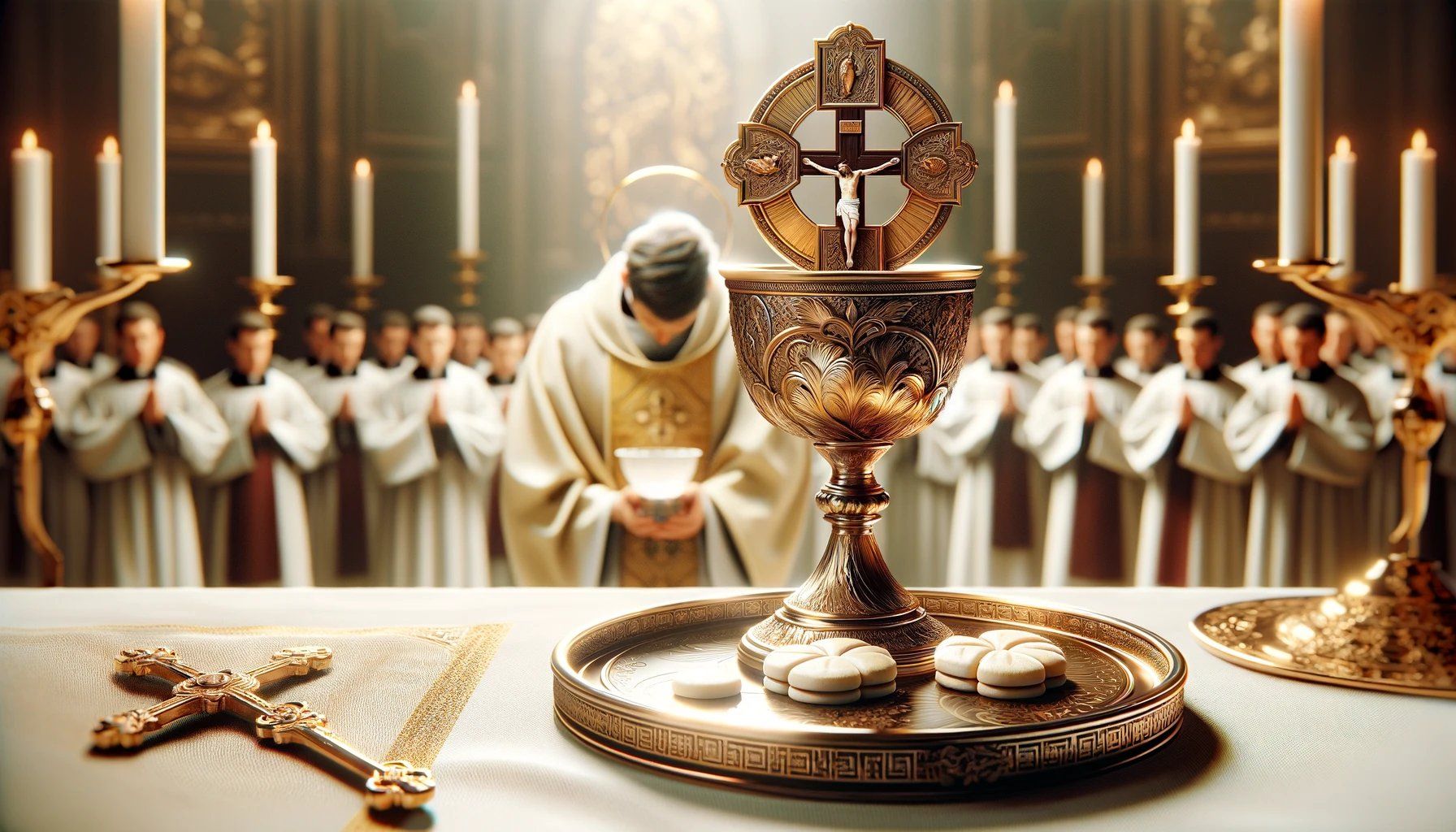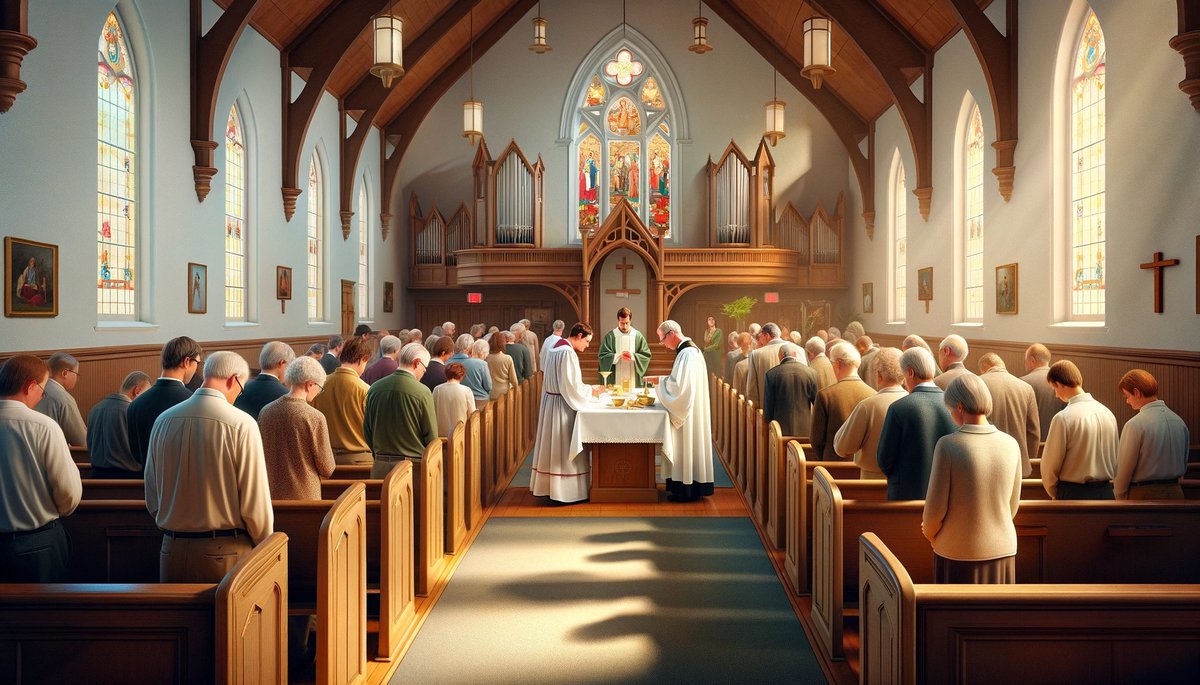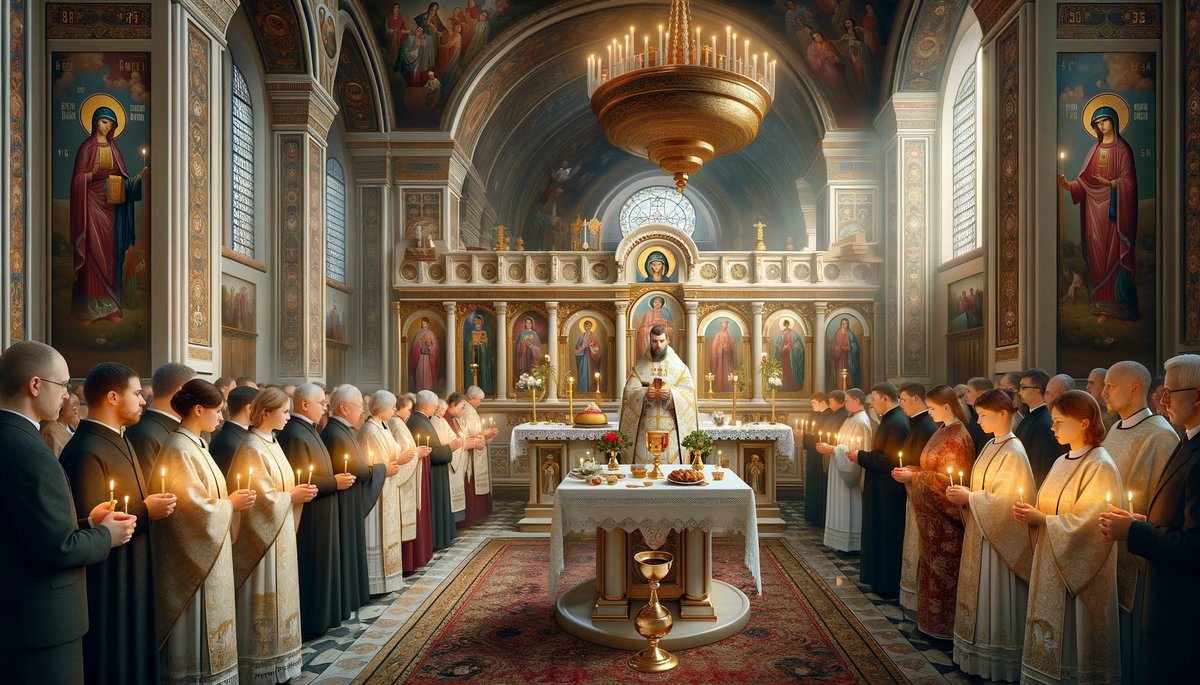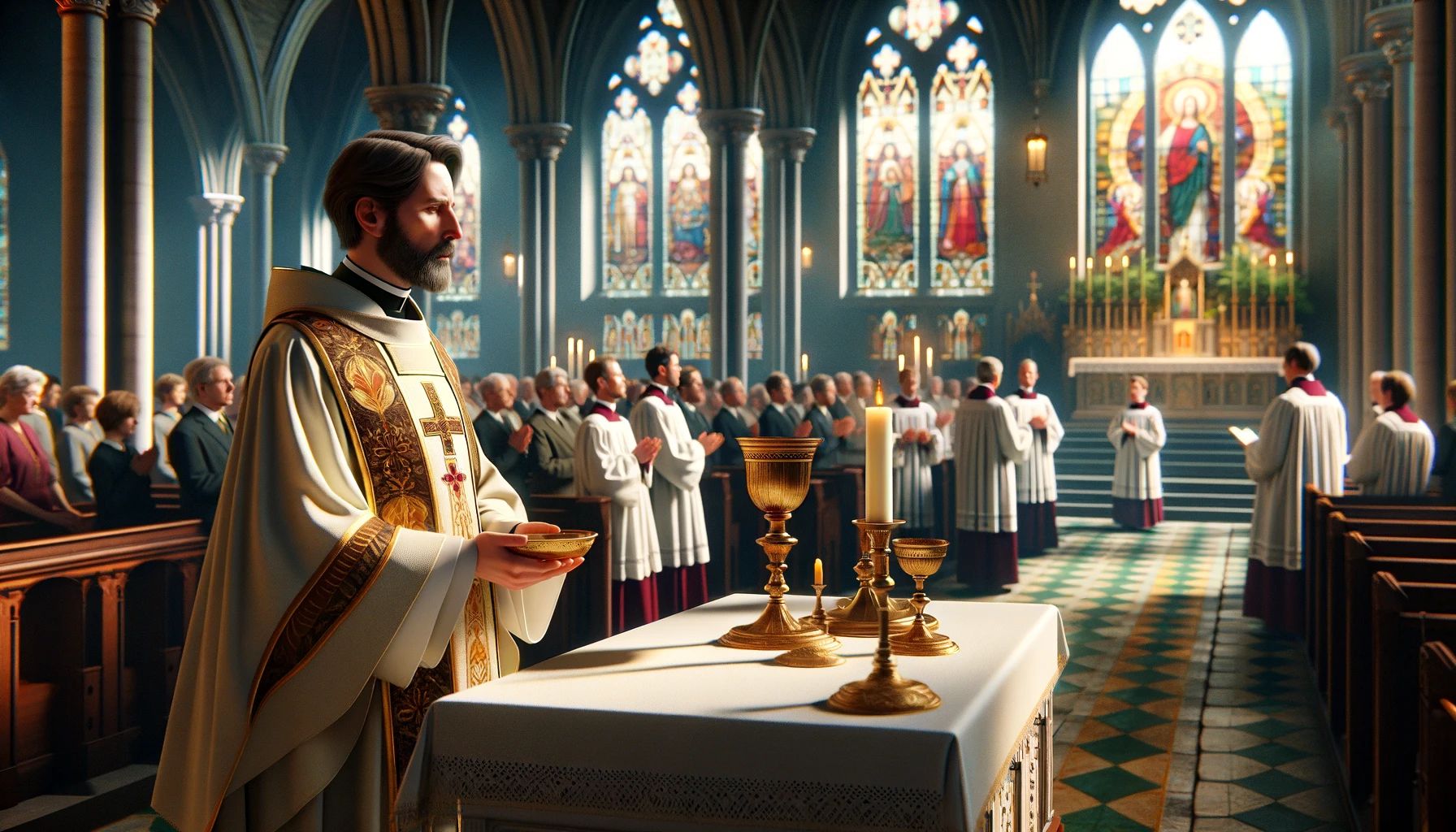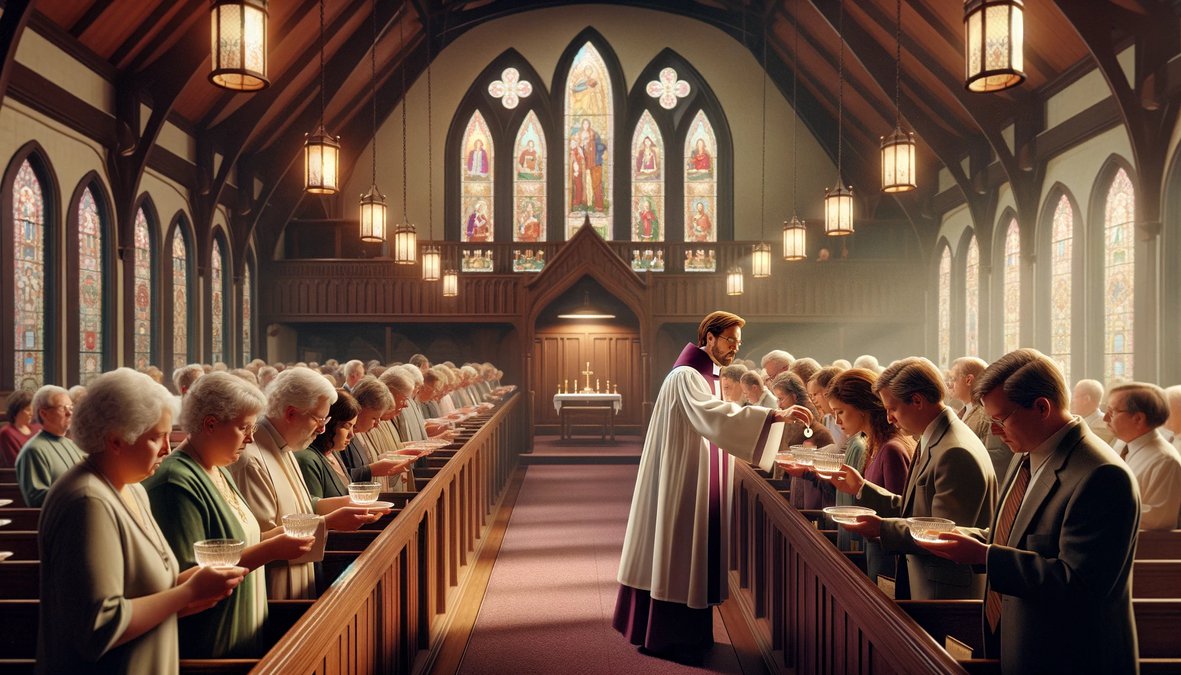Home>Theology and Spirituality>Who Can Take Communion?


Theology and Spirituality
Who Can Take Communion?
Published: February 24, 2024
Ericka Andersen, an editor at Christian.net, expertly merges digital strategy with content creation, focusing on faith and societal issues. Her communication skills enhance the platform's engaging narratives, fostering meaningful dialogue on belief's impact on society.
Discover the theology and spirituality behind who can take communion. Explore the guidelines and significance of this sacred practice.
(Many of the links in this article redirect to a specific reviewed product. Your purchase of these products through affiliate links helps to generate commission for Christian.net, at no extra cost. Learn more)
Table of Contents
Introduction
Communion, also known as the Eucharist or the Lord's Supper, holds profound significance in Christian faith and practice. It is a sacred ritual that symbolizes the central aspects of the Christian faith, including the sacrificial death and resurrection of Jesus Christ, as well as the unity of believers within the body of Christ. The act of partaking in communion is deeply rooted in the teachings of Jesus and has been a cornerstone of Christian worship for centuries.
The practice of communion has evolved over time, taking on various forms and interpretations within different Christian traditions. From the early gatherings of the early Christian communities to the diverse expressions found in modern-day churches, communion remains a unifying element that transcends denominational boundaries.
As we delve into the multifaceted aspects of communion, we will explore its historical significance, the diverse perspectives held by different Christian denominations, the biblical foundations that underpin this sacred practice, and the question of who is eligible to partake in communion. Through this exploration, we aim to gain a deeper understanding of the rich tapestry of beliefs and traditions that surround this sacred sacrament.
The significance of communion extends beyond its ritualistic aspects; it embodies the spiritual nourishment and communal bond that Christians experience as they partake in this sacred meal. It serves as a tangible reminder of Christ's sacrificial love and the unity of believers in the body of Christ. As we embark on this journey to unravel the depths of communion, we will uncover the spiritual and theological dimensions that make this practice a cornerstone of Christian worship and devotion.
Read more: Who Takes Holy Communion
Historical Background of Communion
The historical roots of communion can be traced back to the Last Supper, a pivotal event in the life of Jesus Christ. According to the Gospels, Jesus shared a final meal with his disciples before his crucifixion, during which he instituted the practice of communion. He took bread, blessed it, and gave it to his disciples, saying, "Take, eat; this is my body." He then took the cup, gave thanks, and offered it to them, saying, "Drink from it, all of you; for this is my blood of the covenant, which is poured out for many for the forgiveness of sins." This symbolic act of sharing bread and wine laid the foundation for the sacrament of communion.
In the early Christian communities, the practice of communion held deep significance as believers gathered to partake in the bread and wine, commemorating the sacrificial death and resurrection of Jesus Christ. The communal aspect of sharing in the elements fostered a sense of unity and fellowship among the early Christians, reinforcing their identity as followers of Christ.
Over the centuries, the practice of communion evolved within the context of Christian worship. Different traditions and theological perspectives influenced the understanding and observance of communion, leading to diverse expressions of this sacred ritual within various Christian denominations.
The early church fathers, such as Ignatius of Antioch and Justin Martyr, provided insights into the significance of communion as a means of spiritual nourishment and unity within the body of believers. As Christianity spread and diversified, the practice of communion adapted to the cultural and theological contexts of different regions, giving rise to a rich tapestry of liturgical expressions and theological interpretations.
The historical background of communion reflects its enduring significance as a central aspect of Christian worship and spiritual formation. From its origins in the Last Supper to its diverse manifestations in contemporary Christian traditions, communion continues to serve as a tangible link to the foundational events of the Christian faith, embodying the spiritual nourishment and communal unity that define the Christian journey.
Different Christian Denominations' Views on Communion
The diverse landscape of Christian denominations encompasses a wide spectrum of beliefs and practices regarding communion. Each denomination brings its unique theological perspectives, liturgical traditions, and interpretations of the sacrament, contributing to a rich tapestry of communion observance within the global Christian community.
-
Catholic Church: In the Catholic tradition, communion, also known as the Eucharist, holds a central place in the liturgical life of the Church. Catholics believe in the doctrine of transubstantiation, wherein the bread and wine are transformed into the actual body and blood of Christ during the Mass. This belief underscores the sacred nature of the Eucharist as the real presence of Christ, inviting the faithful to partake in this mystery with reverence and devotion.
-
Eastern Orthodox Church: Similar to the Catholic Church, the Eastern Orthodox tradition emphasizes the mystical transformation of the bread and wine into the body and blood of Christ. The Divine Liturgy, the central act of worship in the Eastern Orthodox tradition, incorporates intricate liturgical elements that underscore the sacredness of the Eucharist as a means of spiritual nourishment and communion with God.
-
Protestant Traditions: Within Protestantism, diverse perspectives on communion exist, reflecting the theological diversity within the tradition. For example, Lutheran churches uphold the doctrine of consubstantiation, teaching that Christ is present alongside the bread and wine in the Eucharist. In contrast, Reformed traditions emphasize the symbolic nature of communion, viewing it as a memorial of Christ's sacrifice rather than a literal transformation of the elements.
-
Anglican Communion: Anglicanism encompasses a broad spectrum of beliefs regarding the Eucharist, ranging from high church traditions that emphasize the real presence of Christ in the sacrament to low church traditions that adopt a more symbolic view of communion. The Book of Common Prayer, a foundational liturgical text in Anglicanism, provides a framework for the celebration of the Eucharist, accommodating diverse theological perspectives within the Anglican Communion.
-
Non-Denominational and Evangelical Churches: In non-denominational and evangelical contexts, communion practices vary widely, reflecting the autonomy of individual congregations and their theological leanings. Some emphasize the symbolic nature of communion as a communal remembrance of Christ's sacrifice, while others incorporate elements of spiritual intimacy and personal reflection into the observance of the Lord's Supper.
The diverse views on communion within Christian denominations reflect the theological richness and historical diversity of the Christian faith. While differences exist in the understanding and practice of communion, the shared reverence for this sacred sacrament underscores its enduring significance as a unifying force within the body of Christ.
Biblical Perspectives on Communion
The biblical foundations of communion are rooted in the teachings and actions of Jesus Christ as recorded in the New Testament. The Gospels provide profound insights into the institution of the Lord's Supper during the Last Supper, where Jesus shared bread and wine with his disciples, instructing them to partake in remembrance of him. This pivotal event serves as the cornerstone of the sacrament of communion, embodying the spiritual significance and communal unity that characterize this sacred practice.
The Apostle Paul further expounds on the significance of communion in his first letter to the Corinthians, providing essential theological insights into the nature of the Lord's Supper. In 1 Corinthians 11:23-26, Paul recounts the words of Jesus during the Last Supper and emphasizes the solemnity and reverence with which believers are to approach communion. He underscores the transformative power of this sacrament, highlighting its role in proclaiming the Lord's death until he comes again.
The biblical perspectives on communion underscore its multifaceted significance as a symbol of Christ's sacrificial love, a means of spiritual nourishment, and a tangible expression of the unity of believers within the body of Christ. The act of partaking in the bread and wine serves as a profound reminder of Christ's atoning sacrifice and the redemptive power of his death and resurrection.
Furthermore, the biblical narratives surrounding communion emphasize the communal aspect of this sacred ritual, highlighting the unity and fellowship that believers experience as they come together to partake in the Lord's Supper. The shared participation in the elements symbolizes the spiritual bond that unites believers across time and space, transcending individual differences and fostering a sense of belonging within the body of Christ.
The biblical perspectives on communion invite believers to approach this sacrament with reverence, gratitude, and a deep awareness of its transformative power in their lives. As they partake in the bread and wine, they are called to reflect on the profound implications of Christ's sacrifice and to embrace the communal unity that defines their identity as followers of Christ.
In essence, the biblical perspectives on communion provide a rich tapestry of theological insights that illuminate the spiritual depth and communal significance of this sacred sacrament. Through the lens of scripture, believers are invited to engage with communion as a tangible expression of their faith, a source of spiritual nourishment, and a symbol of their unity within the body of Christ.
Who is Eligible to Take Communion?
The question of who is eligible to partake in communion is a topic of significant theological and pastoral consideration within Christian communities. The diverse perspectives and practices across denominations reflect varying interpretations of the criteria for participation in this sacred sacrament.
In many Christian traditions, eligibility for communion is closely tied to the concept of being a baptized believer. Baptism serves as a foundational rite of initiation into the Christian faith, symbolizing the individual's incorporation into the body of Christ. As such, baptized individuals are often considered eligible to partake in communion, as it signifies their spiritual union with Christ and the community of believers.
Furthermore, the readiness and disposition of the individual play a crucial role in determining eligibility for communion. Many denominations emphasize the importance of being in a state of repentance and reconciliation with God and others before partaking in the Lord's Supper. This includes a sincere examination of one's faith, a contrite spirit, and a commitment to living in accordance with the teachings of Christ.
In some traditions, such as the Catholic and Orthodox Churches, the concept of being in a state of grace is central to the eligibility for communion. This entails being free from grave sin and having received the sacrament of reconciliation, also known as confession, as a means of spiritual preparation for receiving the Eucharist.
The age at which individuals are deemed eligible to partake in communion varies across denominations. In some traditions, such as infant baptism practiced in certain branches of Christianity, infants and young children are included in the communion service as a reflection of their belonging to the faith community. In contrast, other traditions may have specific age or maturity requirements before individuals are considered eligible to partake in communion.
Ultimately, the question of eligibility for communion is deeply intertwined with the theological, liturgical, and pastoral considerations of each Christian tradition. While differences exist in the specific criteria for participation, the overarching emphasis on spiritual readiness, faith commitment, and communal belonging underscores the sacred nature of communion as a unifying and transformative experience for believers.
The eligibility for communion reflects the diverse theological perspectives and pastoral practices within the Christian faith, emphasizing the spiritual and communal dimensions of this sacred sacrament. As believers engage with the question of eligibility, they are invited to approach communion with reverence, discernment, and a deep awareness of its significance in their spiritual journey.
Read more: Who Can Take Communion In A Baptist Church
Conclusion
In conclusion, the practice of communion stands as a timeless testament to the spiritual nourishment, communal unity, and theological richness that define the Christian faith. From its origins in the Last Supper to its diverse expressions within different Christian denominations, communion embodies the sacred bond between believers and their shared participation in the redemptive work of Jesus Christ.
The historical background of communion, rooted in the teachings and actions of Jesus Christ, serves as a foundational narrative that underscores the enduring significance of this sacred sacrament. The Last Supper, where Jesus instituted the practice of communion, remains a pivotal event that continues to shape the spiritual identity of Christians across the globe.
The diverse views on communion within Christian denominations reflect the theological richness and historical diversity of the Christian faith. Whether it is the Catholic emphasis on transubstantiation, the symbolic interpretation within Protestant traditions, or the diverse perspectives in Anglicanism and non-denominational contexts, communion serves as a unifying force that transcends doctrinal differences and fosters a sense of communal belonging.
The biblical perspectives on communion provide a profound framework for understanding the spiritual depth and communal significance of this sacred sacrament. The narratives of the Last Supper and the teachings of the Apostle Paul in 1 Corinthians offer timeless insights into the transformative power of communion as a symbol of Christ's sacrificial love and the unity of believers within the body of Christ.
The question of who is eligible to take communion reflects the theological, liturgical, and pastoral considerations within Christian communities. Whether it is the emphasis on baptism, spiritual readiness, being in a state of grace, or age-related criteria, the overarching emphasis remains on the spiritual and communal dimensions of communion as a sacred and transformative experience for believers.
In essence, communion serves as a tangible expression of the core tenets of the Christian faith—love, sacrifice, unity, and spiritual nourishment. As believers partake in the bread and wine, they are invited to embrace the profound significance of communion as a means of encountering the living presence of Christ and experiencing the unity of the body of believers.
Ultimately, communion transcends theological differences and denominational boundaries, serving as a unifying symbol of the shared faith and spiritual journey of Christians worldwide. It is a sacred meal that nourishes the soul, strengthens communal bonds, and bears witness to the enduring legacy of Christ's redemptive love.





